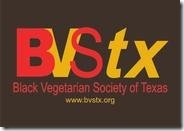
(Photo: The logo of the Black Vegetarian Society of Texas)
By Minnie Payne
Prompted by his own health concerns and reports that African Americans are prone to diet related diseases, particularly hypertension and diabetes, J. J. Johnson founded the non-profit Black Vegetarian Society of Texas in 2001.
“I lost a lot of weight and thought it would be good to bring together other people who were interested in achieving the same thing,” Johnson says.
Barbara Bush, a 15-year vegan and present BVStx secretary/treasurer and past BVStx President, says that the organization is called Black Vegetarian Society of Texas because its first priority is educating the African American community on the health benefits of eating plant-based foods. Despite the name, Bush says, “some of our most active members are not African American.”
Aside from monthly events including presentations, cooking classes and weekend getaways which provide education and support for vegetarians, the organization hosts a variety of events throughout the year. For ten years, the organization has sponsored a one-day Meatout Festival, sponsored by the Farm Animal Rights Movement (FARM) and occurring around the time of the Great American Meatout. This year it was held at the Dallas Farmers Market.
“The festival seeks to educate people on how to become a vegetarian by having speakers which includes panel discussions about health issues,” says BVStx President Donald Moy. “There is also a food sampling, green vendors and health screening.”
The organization also spotlights member owned businesses and maintains a speaker’s bureau with speakers qualified to address a variety of health-related subjects. Vegans who eat out a lot will also find a large number of vegan or vegetarian friendly restaurants in the DFW area on the Black Vegetarian Society of Texas website.
According to the University of Cincinnati’s Net Wellness Consumer Health Information, Americans of all races eat more and are less active than their ancestors, leading to about 66 percent of the U.S. population being overweight or obese. Trends are even more so among African Americans, with 60 percent of African American men and 78 percent of African American women being overweight. Statistics show that 28.8 percent of men and 50.8 percent of African American women are considered obese.
The good news is that eating a nutritious, low fat diet and exercising regularly prevent and treat obesity. Low fat eating and regular physical activity aid in weight reduction and reduces the risk of many chronic diseases. Reducing weight by just 5-10 percent may reduce the risk of high blood pressure, diabetes, and heart disease.
Health issues in the African American community are compounded by occasional family traditions centering on foods heavy with fats, sugar and sodium. Revamping recipes and decreasing portion size may help African Americans reduce their weight and the chronic diseases that accompany it. Nancy DiMarco, PhD, RD, CSSD, LD, Professor & Director Institute for Women’s Health, Texas Woman’s University, says the Dietary Approaches to Stopping Hypertension (DASH) advocate eating a diet based upon a very high amount of fruit, vegetables and low-fat dairy. “African Americans seem to be prone toward hypertension and other diet related diseases and a vegetarian diet would certainly counteract this,” suggests DiMarco. Acting on this advice and combating many of these obstacles, the Black Vegetarian Society of Texas continues to make the promotion of healthy eating a priority for folks both within and outside the African American community.
Minnie Payne is the food reporter for Green Source DFW, focusing on DFW stories that include agriculture, the Botanical Research Institute of Texas, sustainable wines, green grocers, community gardens, green restaurants, etc. She’s open to all food story suggestions from readers. She was a writer for Pegasus News and presently freelances for Living Magazine and Frisco Style Magazine. She can be reached at jdpmap@verizon.net









